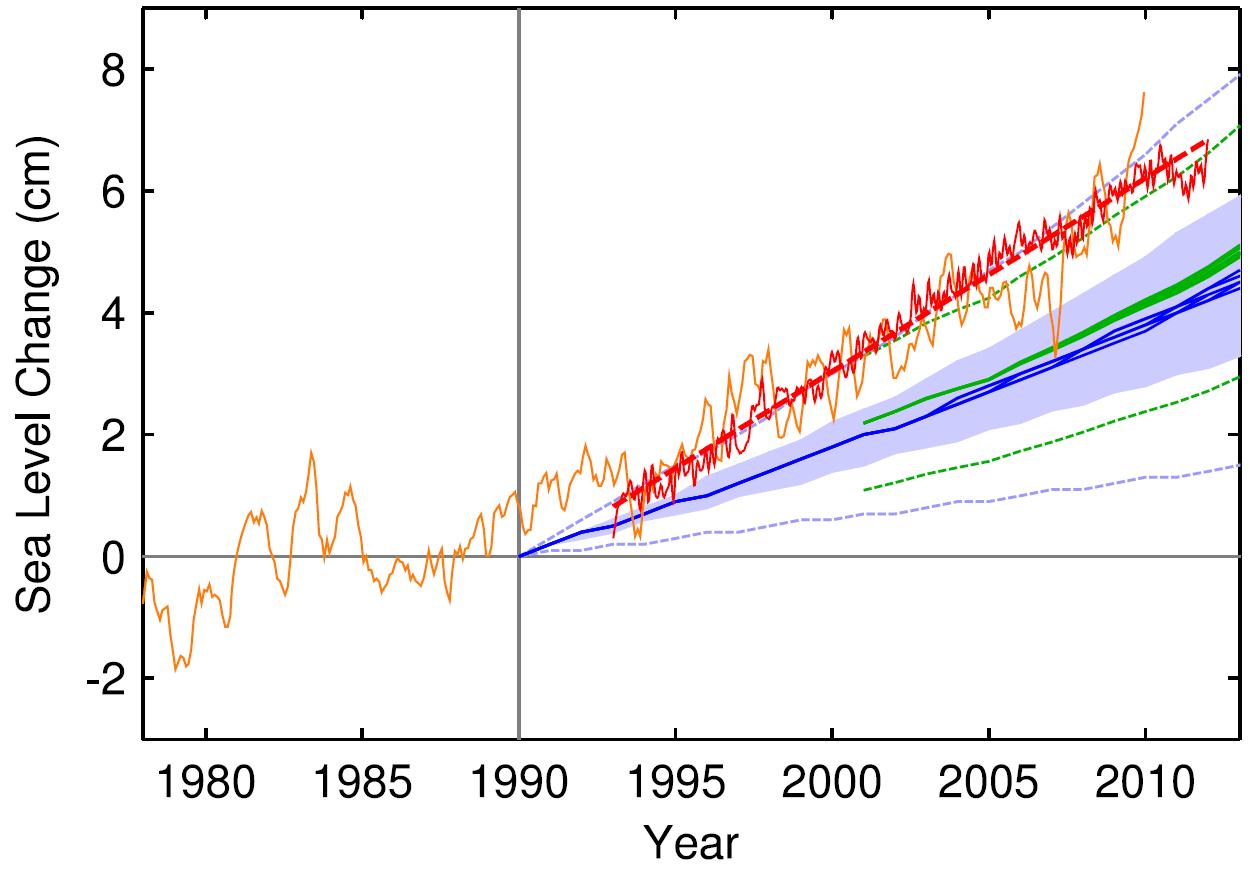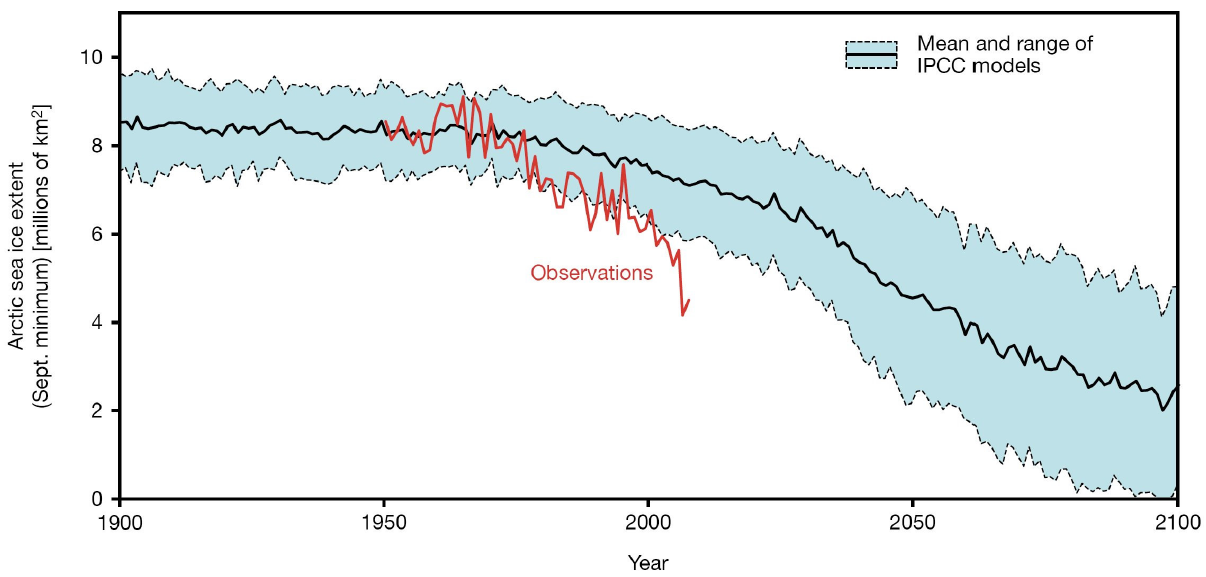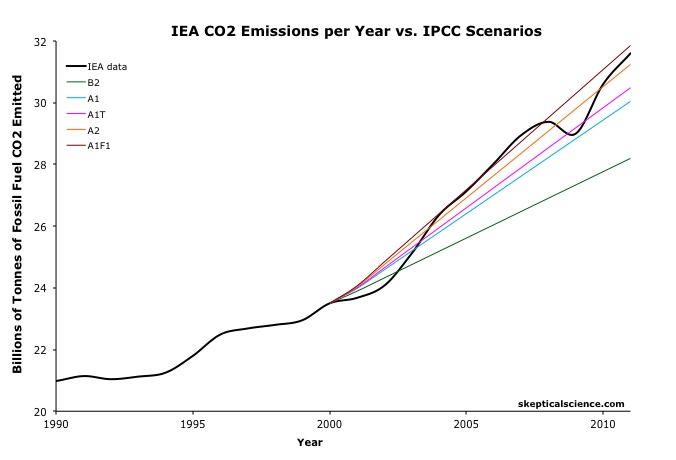Climate Scientists Erring on the Side of Least Drama
Posted on 30 January 2013 by dana1981
A paper recently published in Global Environmental Change by Brysse et al. (2012) examined a number of past predictions made by climate scientists, and found that that they have tended to be too conservative in their projections of the impacts of climate change. The authors thus suggest that climate scientists are biased toward overly cautious estimates, erring on the side of less rather than more alarming predictions, which they call "erring on the side of least drama" (ESLD).
In this paper, Brysse et al. examined research evaluating past climate projections, and considered the pressures which might cause climate scientists to ESLD.
Conservative Climate Projections
While we have recently shown that the Intergovernmental Panel on Climate Change (IPCC) temperature projections have been exceptionally accurate, several other projections in the IPCC reports have been far too conservative.
Sea Level Rise
For example, Rahmstorf (2007) and more recently Rahmstorf et al. (2012) showed that sea level is rising at a rate inconsistent with all but the highest IPCC scenarios (Figure 1). Rahmstorf et al. (2012) concluded,
"The satellite-based linear trend 1993–2011 is 3.2 ± 0.5 mm yr-1, which is 60% faster than the best IPCC estimate of 2.0 mm yr-1 for the same interval"
Figure 1: Sea level measured by satellite altimeter (red with linear trend line; AVISO data from Centre National d’Etudes Spatiales) and reconstructed from tide gauges (orange, monthly data from Church and White 2011). Tide gauge data were aligned to give the same mean during 1993–2010 as the altimeter data. The scenarios of the IPCC are again shown in blue (third assessment) and green (fourth assessment); the former have been published starting in the year 1990 and the latter from 2000.
The main reason these sea level rise projections have been too low and that the IPCC almost certainly underestimates future sea level rise is that their models do not include the effects of dynamic ice processes from chunks of ice breaking off into the ocean ("calving"), then melting. The IPCC approach in attempting to account for these processes considers recent contributions to sea level rise from ice sheet melt, then "assume that this contribution will persist unchanged." This is certainly a conservative approach, and the primary reason their sea level projections have been low.
Arctic Sea Ice Decline
Three years after the IPCC Fourth Assessment Report was drafted, the 2009 Copenhagen Diagnosis examined the latest climate research to effectively update the IPCC report. In addition to confirming the Rahmstorf finding that the IPCC has underestimated sea level rise, the Copenhagen Diagnosis also found that the IPCC has dramatically understimated the decline in Arctic sea ice extent (Figure 2).
Figure 2: Observed vs. IPCC modeled annual minimum Arctic sea ice extent
In 2012, Arctic sea ice melt shattered the previous record low, to levels unseen in millennia, increasing the margin by which IPCC projections have been too conservative.
CO2 Emissions
A 2009 report by the US National Research Council (NRC), Committee on Strategic Advice on the U.S. Climate Change Science Program found that the IPCC had also underestimated recent CO2 emissions from developing countries.
"The IPCC projections are based on estimates that CO2 emissions in China increased at an annual rate of about 3 to 4 percent during the past 10 years (IPCC, 2007a; IEA, 2007), but a subsequent province-based inventory concluded that emissions actually increased at a higher rate of about 10 to 11 percent (Auffhammer and Carson, 2008)....Emissions from a number of other developed countries were also higher than agreed-to targets."
The Copenhagen Diagnosis similarly found that in addition to underestimating sea level rise, human CO2 emissions have tracked towards the highest IPCC scenarios.
Figure 3: IEA fossil fuel CO2 emissions estimates vs. IPCC SRES emissions scenarios.
Permafrost Melt and Carbon Feedback
The Copenhagen Diagnosis notes that the global warming amplification (feedback) from carbon released as a result of permafrost melting has not been accounted for in any of the IPCC projections. A recent UN Environment Programme report warned that failing to account for this feedback will result in an underestimate of future warming.
Other Climate Impacts
The NRC report notes that according to Déry and Brown (2007), northern hemisphere snow cover may also be declining at a faster-than-expected rate, and the Copenhagen Diagnosis states that rainfall has become more intense in already rainy areas, and "recent changes have occurred faster than predicted".
So while the IPCC and the climate science community in general has under-predicted quite a few climate impacts, there are very few examples where they have over-predicted these changes.
"Erring on the Side of Least Drama" (ESLD) to Avoid Alarmism
The IPCC and climate scientists are often accused of "alarmism", but clearly Brysse et al. demonstrates that these accusations are wholly unfounded and misplaced.
"Our analysis of the available studies suggests that if a bias is operative in the work of climate scientists, it is in the direction of under-predicting, rather than over-predicting, the rate and extent of anthropogenic climate change."
In fact, Brysse et al. suggest that these frequent accusations of "alarmism" and other climate contrarian attacks on climate scientists may be one reason why climate scientists have under-predicted climate change, or erred on the side of least drama.
"The frequent attacks on Stephen Schneider—as well as attacks on other climate scientists such as Benjamin Santer and Michael Mann—suggests that one possible reason why scientists may have underestimated the threat of anthropogenic warming is the fear that if they don’t, they will be accused by contrarians (as was Schneider) of being alarmist fear-mongers. That is to say, pressure from skeptics and contrarians and the risk of being accused of alarmism may have caused scientists to understate their results."
However, Brysse et al. note that from a scientific and statistical standpoint, under-predicting an effect by 10% is no less wrong than over-predicting an effect by 10%. Therefore, ESLD can introduce a systematic bias that leads to a reduction in the accuracy of climate projections.
The Ozone Example
Between 2008 and 2011, Brysse et al. conducted a series of interviews with numerous scientists studying and assessing ozone depletion. In February of 1992, NASA scientists studying the Arctic atmosphere issued a press release warning that a major Arctic ozone hole, like the one over Antarctica, could develop that spring. While the science behind the prediction was correct, unexpected factors intervened, and Arctic ozone depletion in 1992 was not as severe as the scientists anticipated.
"In the aftermath of the unrealized 1992 Arctic ozone hole prediction, NASA scientists were severely criticized in the conservative press for crying wolf, causing unnecessary panic, and acting according to emotional imperatives or an environmental agenda instead of according to the dictates of scientific objectivity."
Subsequent to the barrage of criticism over this event, NASA has become more cautious in issuing press releases. Many scientists who researched ozone depletion have now become involved in the IPCC reports. In an interview in 2009, ozone researcher Jonathan Shanklin suggested that scientific assessments operate according to the "crying wolf principle: if you cry wolf too often, then nobody believes you anymore, and the sky does fall in", and also suggested that in the case of recent IPCC predictions of future climate change, scientists’ "best guess for many of these [scenarios] were actually worse than those in the report."
In other words, Shanklin suggests that the IPCC under-predicts climate impacts in order to avoid losing credibility due to ...accusations of "alarmism". Other scientists interviewed by Brysse who were involved in ozone research and the IPCC reports shared similar opinions.
Other Causes of ESLD
In addition to fear of being labeled as "alarmist" Brysse et al. discusses other possible causes of ESLD. For example, scientists tend to invoke the "principle of least astonishment", whereby they typically choose the simplest of two possible hypotheses. However, the rate that climate impacts like Arctic sea loss and sea level rise are occurring and will occur is rather astonishing. Similarly, scientific conservatism introduces "an inherent bias in favor of existing knowledge and presumptions, and the avoidance of conclusions that seem excessively dramatic."
Brysse et al. also believe "that the basic, core values of scientific rationality contribute to an unintended bias against dramatic outcomes...scientists are skeptical of all new claims, and ceteris paribus, the more dramatic the claim, the more skeptical they are likely to be." Dramatic claims open scientists to criticisms not just from climate contrarians, but to their own peers as well.
The Dangers of ESLD
To sum up, climate scientists have tended to systematically under-predict many impacts resulting from climate change. Brysse et al. suggest they do so in "erring on the side of least drama" (ESLD)
- in order to avoid accusations of "alarmism" from climate contrarians;
- because scientists are skeptical by nature whereas climate impacts are dramatic;
- and because dramatic claims open scientists to criticism from their peers.
However, the conservative bias imposed by ESLD produces a dangerous result.
"If climate scientists and assessors are erring on the side of least drama in their predictions, then they are not preparing policymakers and the public for the worst, because they are underpredicting what the worst outcomes might be."
We will give the final word to Brysse et al.
"Our hypothesis of ESLD is not meant as a criticism of scientists. The culture of science has in most respects served humanity very well. Rather, ESLD provides a context for interpreting scientists’ assessments of risk-laden situations, a challenge faced by the public and policy-makers. In attempting to avoid drama, the scientific community may be biasing its own work—a bias that needs to be appreciated because it could prevent the full recognition, articulation, and acknowledgment of dramatic natural phenomena that may, in fact, be occurring. After all, some phenomena in nature are dramatic. If the drama arises primarily from social, political, or economic impacts, then it is crucial that the associated risk be understood fully, and not discounted."
Note: the Brysse et al. results have been incorporated into the rebuttal to the myth that the IPCC is alarmist.































 Arguments
Arguments


































ranyl,
I provided a link to a post here on cumulative emissions specifically because the science tells us that we do not have to stop all forms of carbon emission immediately or we're toast. Yet your subsequent post repeated this erroneous claim as if you hadn't followed the link. Please read it.
The fact is, the more we emit in the long run, the higher the risk of dangerous climate change. But it's far better to invest some short term carbon use into long term carbon reduction (e.g. manufacturing PV and wind turbines) than to continue business as usual while moaning that people keep on emitting carbon and refuse to live in caves.
There are a lot of people in the world who could quite rightly claim that they are entitled to higher levels of energy consumption and better standards of living because they weren't the ones who caused the current problem by doing so in the past. We have to expect them to continue to want to do raise their standards of living. What we can do is invest in technologies that will allow them (and us) to do so while emitting as little carbon as possible. Renewables are one way forward; efficiency is another; curbing to some extent the wasteful lifestyles of the developed world is probably a third. But let's invest the carbon budget that the science tells us we do have wisely.
Re Ranyl
I don't think anyone is saying technology is a 'hero'.
All solutions have their bad points and new technology requires time to mature and develop. But you have to use it first before you can fix the problems.
For instance, would new radar have been developed to handle the problems of wind farms, if wind farms had remained on the drawing board and had never been constructed? The answer is no.
Would we have rules and guidelines about electricity installations if we hadn't started installing electricity in homes? The answer is no.
Deploying any new technology will mean something or someone will lose out. But given that humans are extremely unlikely to give up technology and knowledge, then you have to deploy the technology that does the least damage. Renewable energy is the compromise between human self centred desires and and the need to do minimum damage to the environment that provides resources to create those desires.
Regarding birds, cats and wind turbines. I recently did a back of the envelope calculation and worked out that if all of the electricity in the USA was generated by wind energy, the number of birds killed by the turbines would still be negligible compared with the damage pet cats do, or even buildings and other human built structures. If you had to draw a bar chart, wind turbines wouldn't register on the graph when compared with the bar for pet cats.
Also in the UK the biggest danger most raptors have is from a human armed with a gun. There is a growing bank of knowledge regarding bats and birds now and wind farms, so numerous solutions and guidelines are being drawn up.
vroomie:
Please show supporting documents to some of your assertions, such as:
"[sic] As bats well in a recent in Scotland small scale wind turbines reudced bat activity by 50%."
There is genuine research regarding this:
www.bbc.co.uk/news/uk-scotland-tayside-central-20209896
Following up on the cite by Paul D is this article from the BBC which covers the bat study specifically. It sounds like the one Ranyl was referring to. It recommends minor adjustments in location of home wind turbines. This does not appear to be a serious problem for bats. Are there any citations that suggest wind turbines are a serious problem for bats?
When wind turbines were first deployed there was a lot of noise about raptors. I have heard little of that in recent years. Can current data be cited by those who think this is a problem?
In my browser (Firefox) the preview option is gone. I like to check to ensure links are OK. Spelling errors are also not underlined.
JasonB @40: I agree. The conservative thing to do at this point is to treat fossil fuels as an endowment. They are the capital that bootstrapped modern society into being; now we should live off the dividends rather than plunder the principal. We don't have to go back to living in caves (and obviously there aren't enough to go around), but we do have to reserve fossil fuel use for those applications for which there are no reasonable substitutes.
Reasonable is not the same thing as economic. Economics without a carbon price are false. For example, we can make a car that doesn't use fossil fuels. It's not cheap in today's economics, but the value would be commensurate with its true cost. Which would mean that car ownership would be pretty limited. Which would mean a basic transformation of social structures and relationships.
Same thing for electricity. We can still have it. It'll just be in much smaller amounts until we can do the R&D that extends our non-fossil capability. This R&D would be one of the uses of fossil fuel for which there is no substitute--though it would need to be transparently managed and subject to oversight.
We can do these things willingly, or we can continue to waste our endowment and end up like many a trust-fund baby: depleted and unable to cope with the remainder of our now-pauperized existence.